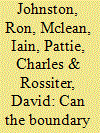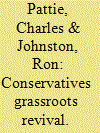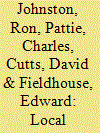|
|
|
Sort Order |
|
|
|
Items / Page
|
|
|
|
|
|
|
| Srl | Item |
| 1 |
ID:
092642


|
|
|
|
|
| Publication |
2009.
|
| Summary/Abstract |
As part of a strategy to remove perceived biases operating against it in the system used for elections to the House of Commons, the British Conservative party is promoting a revision of the rules used by the Boundary Commissions to ensure greater equality in constituency electorates. A Bill designed to achieve this-and also to reduce the size of the House-was introduced to the House of Lords in 2007. This paper critiques that Bill and suggests an alternative formulation that would better achieve the goal, whilst identifying a number of operational difficulties that its implementation would involve.
|
|
|
|
|
|
|
|
|
|
|
|
|
|
|
|
| 2 |
ID:
092364


|
|
|
|
|
| Publication |
2009.
|
| Summary/Abstract |
Healthy party grassroots constituency organisations play an important part in modern electoral campaigning, especially in marginal seats, and political parties try to concentrate their efforts on those closely contested constituencies. Recent evidence on party fund-raising at a local level shows that the Conservatives have taken considerable strides in supporting their campaign organisations in marginals, and have done so in a way which enhances their long-term campaigning potential there. The party's grassroots organisations are increasingly well-resourced, especially in the seats the Conservatives need to win back if they are to win the next General Election. However, while fund-raising suggests a healthy grassroots where it is needed, party membership data highlights continued problems for the party.
|
|
|
|
|
|
|
|
|
|
|
|
|
|
|
|
| 3 |
ID:
105864


|
|
|
|
|
| Publication |
2011.
|
| Summary/Abstract |
The regulation of party political funding and expenditure in the United Kingdom is an issue of continuing political and public debate. Campaign expenditure by candidates has been regulated since the late nineteenth century, but this has applied only during the short campaign period between the dissolution of Parliament and polling day. Concerns have been raised about earlier expenditure levels, but these were not regulated until legislation in 2009 which limits the amount that candidates can spend in the months prior to Parliament's dissolution-in 2010 this covered the period between 1 January and 15 April: the election was held on 6 May. The Electoral Commission has released information on all candidates who made a return of their expenditure during both periods. This article provides descriptive data on those amounts, by party and type of constituency, plus analyses which show that the more that a party spent the better its performance at the polls.
|
|
|
|
|
|
|
|
|
|
|
|
|
|
|
|
| 4 |
ID:
111656


|
|
|
|
|
| Publication |
2012.
|
| Summary/Abstract |
In February 2011 the UK Parliament passed an Act that both reduced the number of MPs to be elected to the House of Commons and significantly altered the rules for the definition of Parliamentary constituencies. After six redistributions in which organic criteria-MPs representing places with a community of interest-dominated the redrawing of constituency boundaries, the new rules gave precedence to an arithmetic criterion: all constituencies must have electorates within 5 per cent of the national quota (average). Seven months later the Boundary Commission published its initial proposals for a new set of 502 constituencies implementing these new rules. This paper evaluates the amount of change to the country's electoral map that this involves, identifies the main features of the new constituency configurations, and assesses their likely impact on UK political life.
|
|
|
|
|
|
|
|
|
|
|
|
|
|
|
|
| 5 |
ID:
153293


|
|
|
|
|
| Summary/Abstract |
Members of the British Labour party have, not for the first time, criticised the Boundary Commissions’ proposals for new constituency boundaries as gerrymandering. This represents a misuse of the term: the Commissions have produced recommended constituencies in the context of new rules for such redistributions that give precedence to equality of electorates across all seats and the boundaries of those constituencies have been defined without any reference to the likely electoral consequences. The Conservatives, who were responsible for the change in the rules to emphasise electoral equality, wanted to remove a decades-long Labour advantage in the translation of votes into seats because of variations in constituency size, and the Commissions’ implementation of those rules has achieved that. A Labour advantage has been removed but not replaced by a Conservative advantage: in terms of electoral equality between the two, the playing field has been levelled. Labour's claim to have been disadvantaged by decisions on the electoral register is also examined; the disadvantage is probably only small.
|
|
|
|
|
|
|
|
|
|
|
|
|
|
|
|
|
|
|
|
|